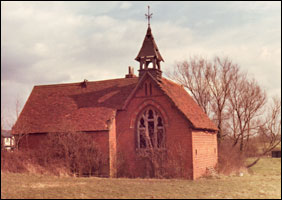![]()
The contents on this page remain on our website for informational purposes only.
Content on this page will not be reviewed or updated.
 |
|
 |
|
|
||||
|
Loughton: National School
|
||||
|
||||
|
For many years the old National School of the village stood in a state of ruin and neglect, but in 1981 it was rescued from decline and converted into a private residence. At least since 1848 a small school had been held in two upper rooms of Elm House, but, with this accommodation as hardly adequate, plans were put in hand - largely through the efforts of the local rector - to construct a proper building, and of the 17 subscribers the local squire made two contributions amounting to almost a quarter of the £400 cost. Being a Harley Street physician by profession, a resident on the Green made a significant donation of £20, and with the remainder of the expense soon amassed the school was built in 1865 on a corner of a common meadow, owned by the church. However, due to the perils of flooding, posed by a nearby stream, a banking up of the site had been necessary, and indeed before the coming of the New City flooding still remained as a periodic problem. Amongst the expenditures for the school, the architect’s bill came to £41 6s 0d, and a foot scraper, 8s 3d, and with the school initially able to accommodate about 40 children, a doubling of this capacity was enabled by the provision of a new classroom around 1894. At this period educational control lay with the Shenley and Loughton United District School Board, but when such bodies were later abolished the Council assumed control. In 1916 the Loughton school closed when the headmaster of Shenley Council School, Mr. Melton, joined the Army, and it was therefore to Shenley that from May 1st 1916 the Loughton children and their headmistress, Mrs. Maud Cresswell, were transferred. However, it was soon made very clear that many people would have preferred a man as the new head, and with trouble arising from the start not least would be the occasion when, instead of being in class, one of the pupils was found to be working on the land. Then in a later incident it became necessary to punish the lad, and the subsequent caning so enraged his parents that when his mother came to the school the police had to be called, such was the disturbance she made. The father also made his opinions felt, for on meeting the headmistress in the street his tirade of verbal abuse expressed the earnest hope that “We will kick you out …” Therefore, when Mr. Melton returned from the Army many hoped that he would return to the school, but instead he moved elsewhere, and a petition was subsequently raised asking the Education Committee to appoint a man as the headmaster. On May 19th 1919 this was duly presented to the Managers, who attending a meeting on the same date with the boy’s father heard him make several slanderous accusations against Mrs. Cresswell. However, following the evidence of Mrs. Cresswell and a number of other witnesses the jury returned a verdict in her favour, and, with this also being the opinion of the judge, she was awarded damages of £200.
|
||||
|
|
||||
|
|
||||


